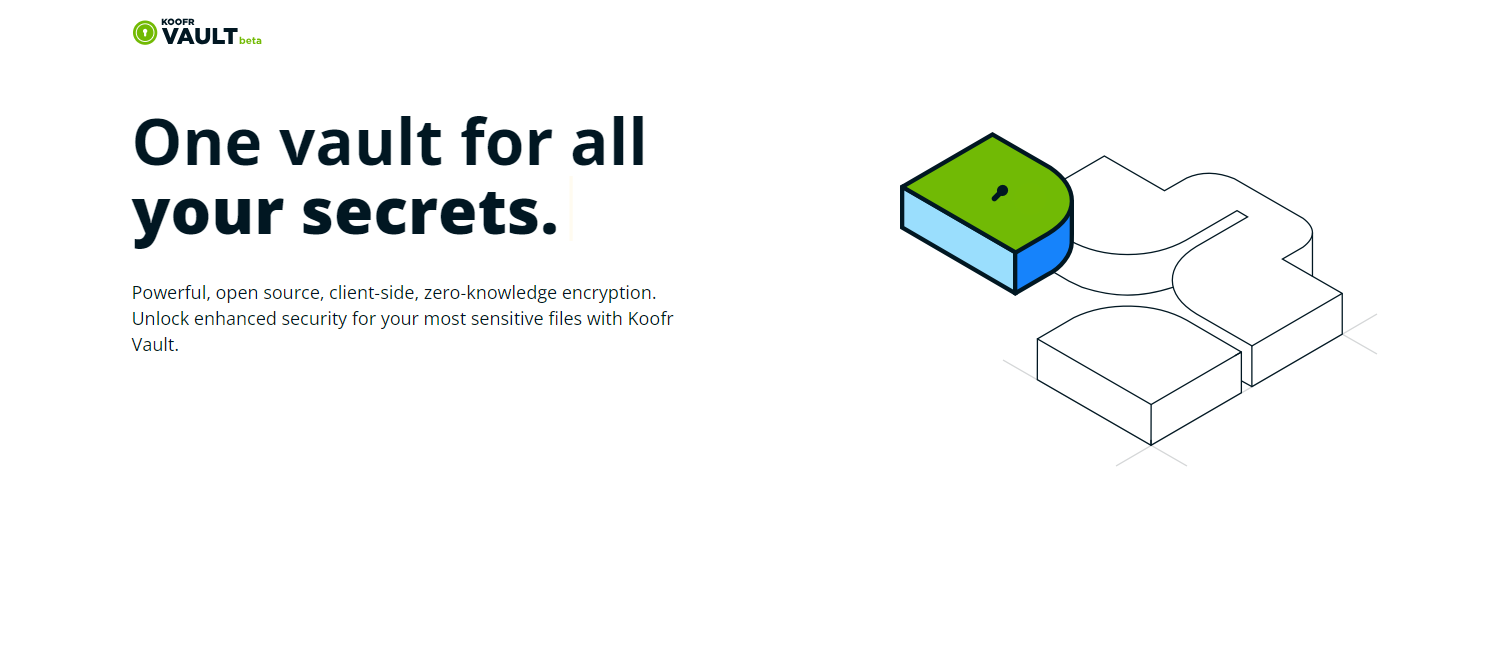The Importance of Encryption in Cloud Storage
Find out the role encryption plays in securing the data stored in the cloud and its importance in safeguarding our digital assets. Understand the process with which encryption helps turn cloud storage into a digital safe for your most valuable and sensitive information and find out how Koofr prioritizes data privacy and security with its robust encryption solutions.
Written by human for humans
In an era dominated by technology, where the digital landscape advances at a remarkable pace, cloud storage has become an irreplaceable solution. The convenience of having our files accessible from anywhere, coupled with the flexibility to seamlessly share and collaborate on them in real time, has made cloud storage widespread and a necessity. At the same time, we cannot overlook that with the positive technological advancements, the negative side is also evolving rapidly. Cyber threats are increasing, and with them, the importance of securing our data.
The modern digital world we live in is defined by the persistent generation, exchange, and storage of data. As our reliance on digital platforms increases, so does the need for robust data security measures. The repercussions of data breaches can be severe, ranging from compromised personal information to severe financial loss. That is why the significance of data security has reached new levels, motivating both individuals and businesses to think about their digital defense strategies and the safety of their digital assets.

Encryption is at the core of the pursuit of digital security. Serving as a powerful shield, it ensures that our sensitive data stays protected from prying eyes and unauthorized access. Its importance plays a vital role for anyone who prioritizes the safety and confidentiality of their data. Understanding the importance of data encryption and implementing it to our data is an essential defense measure against the constantly evolving cyber threats.
1. Explaining data encryption in the cloud
Imagine encryption being a secret code that is scrambling your digital information into an unreadable form. This process ensures that only those with the right key can decipher it and access the original data. It is like having a secret language that only you understand, and that keeps your files safe from prying eyes.
Encryption doesn't stop at securing your data when it is stored on servers. We distinguish between two concepts: data at rest and data in transit. Think of data at rest as your data resting on servers of your cloud storage provider. Encryption steps in to shield it from potential breaches or unauthorized access while it is peacefully stored. Now, picture the concept of data in transit as your data being on the move on the highways of the internet. Encryption doesn't take a break here, either. It makes sure that your data remains safe throughout its journey. This way, even if someone intercepts your data while it is on its way, all they will encounter is indecipherable code.
An important part of this digital security process are encryption keys. They serve as tickets to the original, unscrambled data. Without the correct encryption key that helps you decrypt your data, your data is inaccessible. The strength of the encryption key directly correlates with the level of data security, emphasizing the importance of keeping it private.
If we dive deeper, encryption at rest is divided into two categories: server-side encryption and client-side encryption, according to who is keeping the encryption keys safe - the provider (server-side encryption) or the user (client-side encryption). If a cyber attack is aimed at your cloud storage service provider, server-side encryption will not help maintain the safety of your data. Since the provider retains the keys for all its users, if the provider is compromised, all user data becomes vulnerable, allowing attackers access to everyone's files. In contrast, client-side encryption offers a more robust defense. With client-side encryption, even if the provider is breached, attackers would need to compromise both the provider's system and each individual user's encryption keys to gain access to their files.
2. The importance of encryption in cloud storage
Storing data remotely in the cloud storage rather than at a user's home offers several advantages. However, this distance also introduces potential risks that emphasize the importance of encryption in cloud storage as a crucial security measure. Encryption is safeguarding your data from potential unexpected surprises, making it a security superhero of the cloud storage world. Why? Because there are different potential dangers lurking on your data. Data breaches, for example, are a significant threat in the cloud environment and they are getting more and more sophisticated. Cybercriminals want to exploit the vulnerabilities in the cloud storage infrastructure to gain unauthorized access to sensitive information. Even with robust security measures, that is not impossible.

Encryption is a crucial aspect of data protection in the cloud. It ensures that even if unauthorized individuals gain access to the stored data, they cannot decipher or use it without the encryption key. The use of strong encryption algorithms adds an extra layer of security, rendering compromised data practically useless to attackers.
While users often assume that cloud storage providers handle all of the aspects of data security, it is important to note that they, in fact, follow a shared responsibility model. They secure the infrastructure and offer additional security features, while users also bear part of the responsibility. They need to secure their data with additional measures on their side like strong passwords, two-factor authentication, and client-side encryption. The reality is that while providers can implement robust security measures, they cannot control user behavior, configuration errors, or the potential for human error, so it is important the users are aware of potential threats and actively do their part in keeping data safe and secure.
While cloud storage service providers offering server-side encryption provide convenience, compatibility with third-party services (like WebDAV), and peace of mind since users need not worry about losing encryption keys, it's important to note that if the provider is hacked, both user data and server-side encryption keys are compromised. In this case, it is really important that users responsibly take care of their side of safety measures, by using client-side encryption, which is the only thing keeping data safe if the provider is hacked.
In the next paragraph, we'll explain the specifics of how Koofr, a secure cloud storage solution, employs encryption to ensure your data remains impenetrable and secure in the cloud.
3. How Koofr prioritizes your data security in the cloud
Koofr stands out as a cloud storage provider with a focus on privacy and security. It sets itself apart by demonstrating a commitment to responsible data practices. Emphasizing the protection of user information, Koofr employs robust security measures to guarantee the confidentiality and integrity of stored data.
To enhance data security, Koofr employs server-side encryption, automatically encrypting data at rest on its servers. This means that in the event of unauthorized access, the stored data remains unreadable without the appropriate decryption keys. The application of industry-standard encryption algorithms, such as Advanced Encryption Standard (AES-256), known for its strength and reliability emphasizes the robustness in safeguarding sensitive information.
Koofr takes security to the next level with Koofr Vault. This feature introduces client-side encryption, granting users enhanced control over the security of their files. The files are encrypted locally on users’ devices before they are uploaded to the cloud. The encryption keys are user-controlled. Users have the authority to generate, manage, and safeguard their encryption keys. They are also the only ones able to decrypt and access their Vault files, providing an extra layer of protection against unauthorized access. This fact gives users the confidence that their data is not only encrypted during transit and at rest but is also under their exclusive control, making Koofr a secure choice for individuals and businesses seeking a trusted cloud storage provider.

4. Choosing a safe and secure cloud storage provider
The choice of a secure cloud storage provider is pivotal in today’s world for the protection of your digital data. As you navigate this decision, contemplate the following factors to make sure that your selected provider prioritizes the highest standard of encryption and data security.
Look for a provider that implements strong, industry-grade encryption standards, such as the Advanced Encryption Standard (AES). This ensures that your data is well-protected both at rest and during transit. Select a provider that is transparent about its data practices. Clear and comprehensive privacy policies detailing how your data is handled, stored, and protected show a commitment to user privacy and security.
You can choose between cloud storage providers that offer client-side encrypted storage by default and those that do not but instead provide a client-side encrypted add-on. Your choice should depend on your specific needs. To learn more about why Koofr does not offer client-side encrypted storage by default and instead provides it as an add-on, read our previous blog post Client-side encryption: why does Koofr offer a client-side encryption add-on.
Koofr aligns with all the criteria mentioned above and goes the extra mile with Koofr Vault, offering an additional safety measure of client-side encryption. Consider Koofr as a solution for your cloud storage needs and explore its security features today. Your data's security should not be a compromise, so choose your cloud storage provider wisely.
In summary, the importance of encryption in cloud storage cannot be overstated when discussing cloud storage security. Data encryption serves as a shield, protecting data privacy. Encryption transforms sensitive information and makes it unreadable without the correct decryption key. This safeguards data at rest and during transmission and mitigates the risk of unauthorized access. And while cloud storage providers can handle part of data security, it is important that users also proactively do their part to keep their data secure. In comes Koofr, offering advanced encryption on the server as well as client-side in the form of Koofr Vault, which offers users an additional option for proactively securing their data.
Try Koofr today and never again worry about the safety of your files.
Join us on the Koofr subreddit and discuss the role of encryption in cloud storage security.


